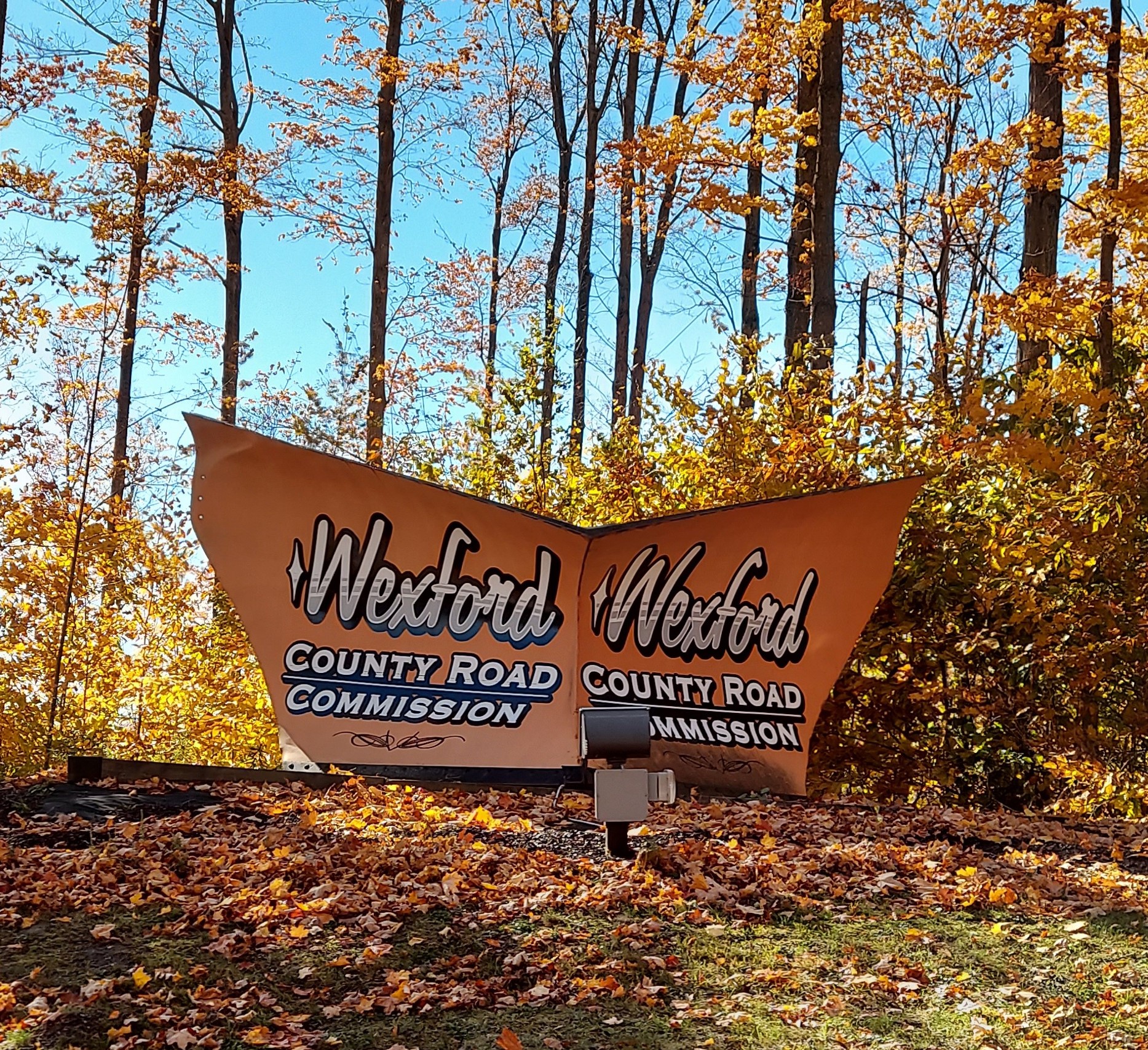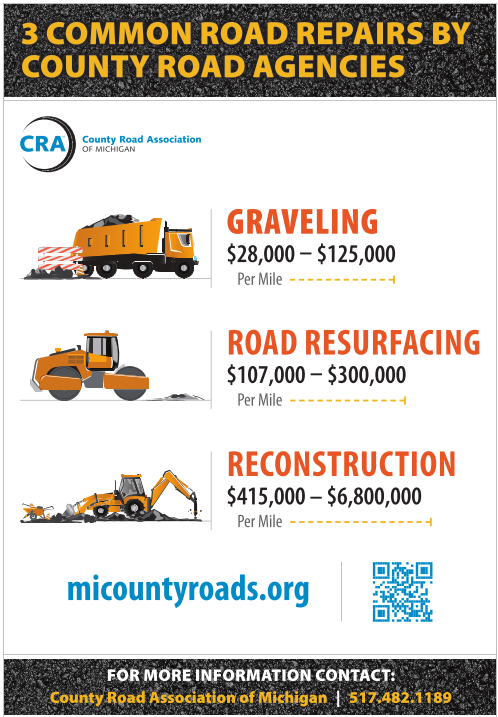Wexford county road commission
The Road Commission for Wexford County (WCRC) is the county-level road agency in Wexford County, Michigan.
Road Miles:
185 Primary
830 Local (Unpaved 725)
334 Lane Miles maintained under contract with MDOT

frequently asked question
How are road funds divided between the state and local road agencies?
State fuel tax and vehicle registration fee revenues are collected in a single "pot" known as the Michigan Transportation Fund. After money is taken off the top for a number of items including the Bridge Fund and Mass Transit, the remaining money is divided between the Michigan Department of Transportation, county road commissions and cities and villages according to a formula established by the state Legislature.
The formula calls for 39.1% of the money to go to MDOT (which has jurisdiction over 8% of Michigan's roads), 39.1% to go to county road commissions (which have jurisdiction over 75% of Michigan's roads) and 21.8% to go to cities and villages (which have jurisdiction over 17% of Michigan's roads).

My property taxes go up every year, why doesn’t the Road Commission fix my road?
The Road Commission does not directly receive any property tax revenue. Most property tax revenue goes to the State of Michigan and local school districts to pay for school operations, while small amounts go to the County General Fund and Township government administration, with special voted millages going to fund certain functions like the library, Central Dispatch (911), and others. Selma Township is the only township in Wexford County with a voted road millage. The only other tax money the Road Commission receives for road maintenance comes from the Michigan Transportation Fund administered by the State of Michigan. State collected fuel taxes, license fees, and vehicle registration fees make up most of this fund, which is divided by law among the 83 counties and 534 cities and villages, with the State keeping about forty percent for their programs. While these funds help us provide basic services such as grading gravel roads, pothole patching, and snow plowing, this level of funding doesn’t allow us to make significant improvements on most County Local Roads. The Road Commission actively seeks State and Federal grant funds whenever available, and encourages participation in road improvement projects by other agencies and local Township Government. Unfortunately for most local roads, most grant programs target their funding to the main Primary County Roads, which in most cases are already paved and in fairly good condition, and most Townships operate on a modest budget that cannot provide the large amount of funds necessary to upgrade or pave many roads.
People are always speeding on my road. How can I get the speed limit lowered and some signs put up to slow them down?
The Road Commission is the agency that installs and maintains all traffic signs on county roads. State law requires the Road Commission to follow the requirements of the Michigan Manual of Uniform Traffic Control Devices (MMUTCD). In order to install Regulatory type signs like no parking signs and speed limit signs, the Road Commission must initiate a traffic study of the road in conjunction with the Michigan State Police (MSP). The study includes a review of traffic counts, accident history, speed studies, the character of the area along the road, and any other information available regarding the problems in the area. While the Road Commission is a participant in the traffic study and analysis, the guidelines of the MMUTCD and judgment of the MSP largely determine what speed limit will be adopted. At the conclusion of the study the MSP issues a written Traffic Control Order directing the Road Commission to install specific signs at specific locations on the road, and to record the completed Traffic Control Order at the County Clerk’s office.
Why is my road always the last one plowed after a snowstorm?
The Road Commission organizes snow plowing operations to service the most heavily traveled roadways first during and after a winter storm. About 362 miles of State Highways and 167 miles of County Primary Roads and certain high traffic local roads in the urban area are plowed and/or salted first. After those roads are passable, crews move on to clear local paved roads throughout the county. Typically, local subdivision streets and rural gravel roads are cleared after all other higher traffic roads. While it is the Road Commission goal to make at least one pass on all local roads the day of the snow storm, our crews may begin plowing/salting several hours before the morning peak traffic, and continue operations into the night. Extended winter storms or continuing winds may require crews to continually plow the main high traffic roads and prevent them from reaching subdivision streets or rural gravel roads each day. Weekend plowing of local roads is performed only when the roads are not passable.
Do I need a permit for a new driveway even if I do the work myself?
Yes, a permit from the Road Commission is required anytime work is performed in the County road right of way. When you apply for a permit you are helping the Road Commission maintain safety for both yourself and the traveling public. Most traffic accidents occur at intersections or where vehicles are entering or leaving the roadway. The Road Commission inspects each proposed drive location to assure that adequate sight distance is available, to determine what drainage improvements might be necessary, and to review the site for other potential safety problems before a permit is issued. Although there is a nominal charge for a residential driveway permit, there is no permit fee for most other minor work in road right of way, although we require that all contractors follow accepted traffic safety procedures and furnish adequate insurance coverage to protect both the homeowner and the public.
Why are you cutting down all the trees on my road?
The Road Commission has an ongoing program to grade rural Local County Roads throughout Wexford County. The roadsides on many of the roads that are being worked on in this program have become overgrown with brush and trees over the years to the point that fairly extensive trimming and cutting is necessary to restore safe sight distance for motorists along the road and to help prevent vehicle collisions as well as damage to trucks, buses and Road Commission vehicles. Although State law created a public right of way 66 feet wide for all county roads, the Road Commission is not seeking to clear, cut, or mow the entire right of way, and it is doubtful that we would cut all the trees on your road.
How can I get my road paved?
The level of funding provided to the Road Commission by law is not sufficient to pay for the initial paving of a road. Although Township government has no responsibility for road maintenance or improvement, and does not receive any road tax money, they have been very supportive of county roads over the years, and you may wish to contact them to see if they have any plans to improve your road in the future. You can also circulate a Petition to set up a special assessment district to improve your road. When signed by the owners of 51 percent or more of the frontage on a road such a petition authorizes the Township to set up a special assessment district, and hold public hearings regarding the proposed project. All properties accessing the road would share in the expense of the project as established by the special assessment district.
Can I fill in the ditch and plant trees in front of my property?
If there is a ditch along the road in front of your property you should not fill it in even if it doesn’t drain water along the road. The purpose of most roadside ditches is to prevent water from pooling on the roadway during or after a storm, to provide an area for snow storage from snowplowing operations, and to lower the water table beneath the roadbed. Filling in even a fairly shallow roadside ditch can cause serious damage to the road and pavement from frost heave and, of course, shrubs and trees planted in that area are exposed to damage from traffic, snowplowing, and sweeping operations. Please do not plant any trees or shrubs that may become a vision obstruction or that may grow into a large fixed object that presents danger to motorists anywhere inside the road right of way. Trees and ornamental plantings should be set back at least 33 feet from the center of the road, which in most cases will place them outside of the road right of way and protect them from traffic damage.
What are “Seasonal” roads?
Seasonal Roads, by law, cannot be maintained by the Road Commission from November 1 through April 30. In 1994 the Wexford County Road Commission held public hearings and adopted a system of seasonal roads that were not used by the public on a permanent full-time basis. Improvements made to a seasonal road must be paid for entirely by the property owners and/or the township.
What are "All Season" roads?
“All Season” roads are those that have been designed and built with additional strength and durability to withstand truck traffic loads all year long, and thus they are not subject to the reduced load restrictions that are placed on most roads during the early spring in Michigan. All residential subdivision streets, most rural sealcoated roads, and all gravel surfaced roads in Wexford County are subject to a reduction in allowable loads during each spring when thawing of the ground below the road softens the roadbed and makes the surface susceptible to damage from heavy loads, creating potholes.
How can I get a Children Playing sign put up to protect my children?
The Road Commission no longer places or maintains Children Playing signs, although there are still several of these signs scattered throughout our road system. Prior to the revision of the Michigan Manual of Uniform Traffic Control Devices (MMUTCD) in 1983, these signs were acceptable for use on county roads. Studies done nationally leading up to that revision demonstrated conclusively that, while these signs may make parents and children feel safer, they have absolutely no effect on driver behavior, and do not slow traffic speeds as might be expected. To the extent that the signs might make parents or children think they are safer when the danger is still present, these signs can actually reduce safety. The best policy is still to be sure to keep children as far away from the road as possible, and don’t allow even older children to play in or near the road.
Why do you spread tar and stone on the paved roads? There was nothing wrong with the road and now it is a mess?
The process is referred to as sealcoating which most road agencies in Michigan use as a relatively low cost method of preserving existing pavements. The tar is actually an emulsion of water and liquid asphalt which penetrates and seals small cracks in the existing pavement. Sealing these cracks on a regular basis prevents water from seeping into and softening the base of the road and over time causing potholes to form. The porous stone that we use to cover the asphalt emulsion sticks and, after rolling and sweeping, provides a slightly roughened skid resistant surface to improve safety. Although sealcoating can preserve and extend the life of the pavement, it is only a surface treatment and does not fill any existing bumps, holes, or irregularities and thus does not improve the ride quality. For this reason it is important to apply sealcoat to a road BEFORE this deterioration occurs, which leads us to sealcoat roads that are in generally good condition rather than waiting for them to deteriorate to the point that extensive patching is necessary.
Why doesn't the road commission split shifts to avoid overtime?
Split shifts would still only allow maintenance without paying overtime for 40 hours per week, whether those hours are Monday – Friday or Wednesday – Sunday. While split shifts would allow us to maintain state trunklines and primary roads on regular time during weekends, the shift in manpower would require lengthening each driver’s route during the rest of the week, making it impossible to maintain all local roads each weekday. While that split shift would benefit the state trunklines, it would come at a cost of more overtime spent on local roads. The Wexford County Road Commission has downsized to the point that spreading our drivers even thinner would not allow us to continue the current level of winter maintenance on every road after a snowfall. The only way to increase service to local roads and subdivisions would be to increase staff and/or pay more overtime. Unfortunately, that is not an option available at this time.
Everything You Need TO KNOW, All in One Place
Board Meetings
Board meetings are held the last Wednesday of each month at 7:30 a.m. in the Commission Room of the Road Commission Any date or time changes will be updated and posted below. Interpreter services (including foreign language and hearing impaired) will be provided at public meetings with an advance notice of seven calendar days to the WCRC.

